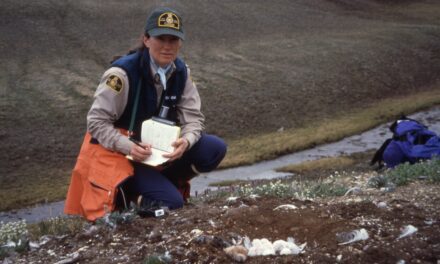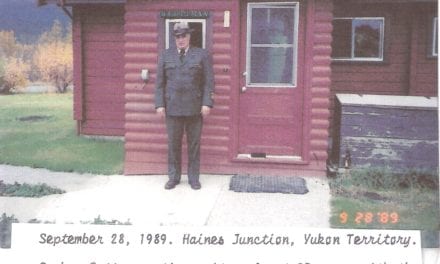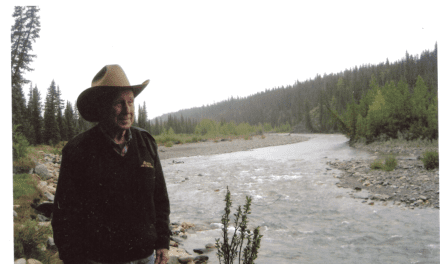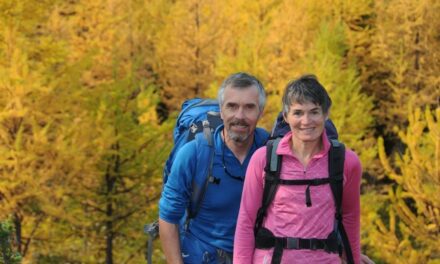When the Grizzly Bear Research Project wound down in 2005 my job transformed to not just being a grizzly bear specialist, but to the carnivore specialists and not just for Banff, but for all of the Mountain Parks. I ended up with five bosses instead of one boss. I continued doing a little bit of research right up until the end of my career, mostly development of innovations around techniques to collect DNA from bears. DNA analysis was a big thing back then, and people were trying to figure out whether you can collect it from hair on rub trees, or whether you could use barbed wire fences. There was also another whole branch of research looking at trying to get DNA from bear scat, I had the scat collecting dog, and spent several years trying to develop that technique. We also used camera traps a whole bunch, because that technique was still very much in the research and development phase of an emerging new technology. But mostly in the last half dozen years, I did the politics of bears. Lots of briefing notes, and bears were still a big deal. Bears were the lightning rod sparking the ongoing controversy between preservation and development of our National Parks. Back then the controversy was at its height, and grizzly bears ended up being the pointy end of the problem. So did a lot of that stuff. I retired in 2011, two weeks after my 55th birthday, the freedom 55 program. I’d started when I was 19, and so I had to wait till I was 55 years old to retire. I took the opportunity to retire because 1) the Nature Conservancy had already offered me a job, and 2) I could see that the senior management wasn’t all that interested in what I was doing. I was mostly a stick in the spokes of where Parks really wanted to go. As it turned out after retiring in June the Harper government made a series of large staffing cuts to the government in September of 2011. Many of the science staff in Parks got cut. My job, of course, was never filled again. There was a huge change in the direction of National Parks, just after I retired, so I just inadvertently stepped out at the right time.
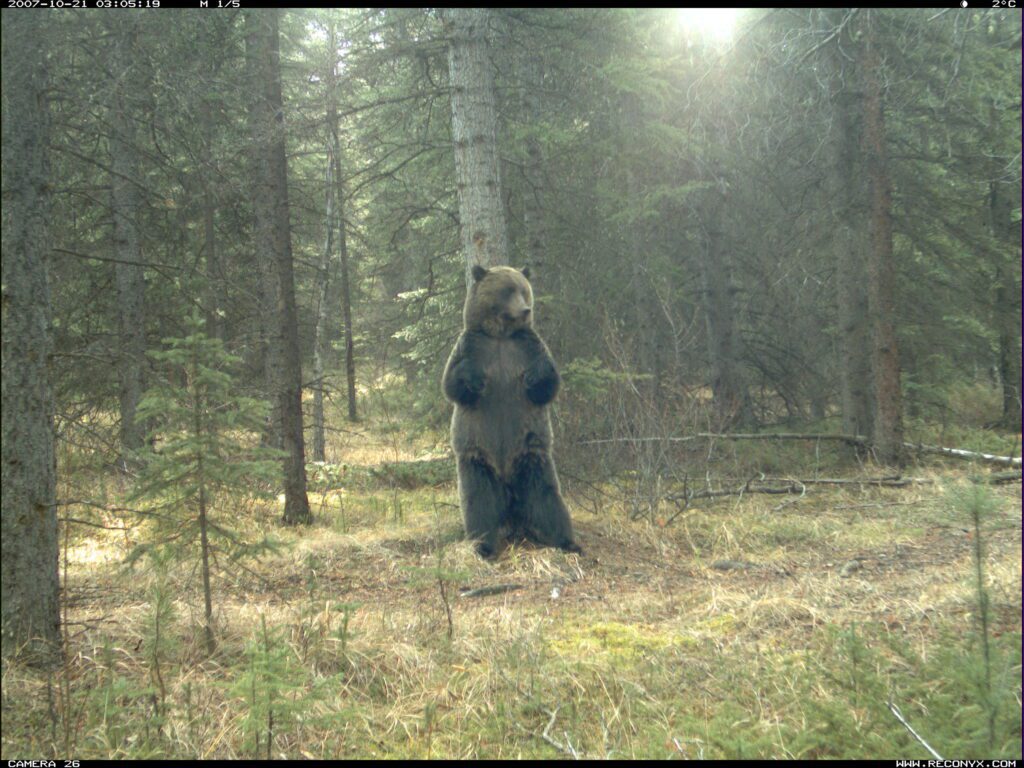
Remote camera captures large male grizzly bear at a rub tree used to collect hair for DNA analysis in 2009
So, I certainly had a very unconventional career compared to most Wardens. Yeah, so very different from most people. The traditional Warden, up until 15 years ago, was a very broad job with many different skills and abilities. My career took me down a path, becoming highly specialized. There was a period where I think a lot of people in Parks were becoming specialized. These days people are more compartmentalized than specialized. But certainly, my career epitomized that specialization.
MH: When did you do your undergrad degree?
MG: I only worked summers, June, July, August for half a dozen years. I was in school in Edmonton the rest of the time and had my summer job as a Park Warden.
.
MH: What did you like / Dislike about being a warden?
MG: Well of course the nostalgia over being a Warden was always being a backcountry warden, riding a horse, having a packhorse and living in the woods. I very much lived that for the first half a dozen years or so. That was a lot of fun. Everybody remembers those as being the best years. The wildlife research was also a lot of fun. And, of course, traveling around to various parts of the world, not that most wardens ever get to do that, but certainly in my career, I got to do that.
MH: disliked?
MG: I didn’t like doing the law enforcement stuff. I never gravitated towards that. But having said that, I was involved in one of those big poaching cases back in the early 1980s.. It was a multi park poaching case with a guy from United States that had come up with a guide outfitter, and poached a sheep in Jasper at the Icefields, an elk in Banff. It turned out there were a couple of other animals as well. That was rewarding because it was more not just the standard law enforcement, but an investigation. It took months and months to put it all together. That still sticks out in my mind. That whole event has been turned into a book. It’s a work of fiction, but in the acknowledgments, it says that only Mike Gibeau will remember where the book departs from fact and what is fiction. Dave Butler wrote the book and It’s called Full Curl. Law enforcement was not something I really enjoyed.
MH: What were some of your more memorable events as a Warden?
MG: There were all kinds of stuff when we were doing research. Coyotes and then the wolves. Certainly, the black bear study was fun. Even the early days of my career was a lot of fun.
MH: Did you have any challenging encounter? 23:05
MG: Well, there’s always some of those. People always like to tell you bear stories and I just make it a point that I don’t tell people bear stories, because having worked with bears more than most, I’ve had probably more encounters or incidents than most, but I always keep those to myself. Every time you tell those stories, you end up creating fear and perpetuating the myths about bears that usually aren’t all that correct. I don’t tell anybody.
Some of the other fun stuff, early in my career. It was always fun to get out on we called Fuhrmann sanctions. The courses that Peter Fuhrmann would take you on both summer and winter, to keep up some level of competence, I was totally incompetent in climbing and skiing as well. I’d never skied before being in the Warden Service. I got flung into doing avalanche control and I could hardly ski, so you learn fast. A lot of those winter ski trips, or the summer climbing trips were a lot of fun.
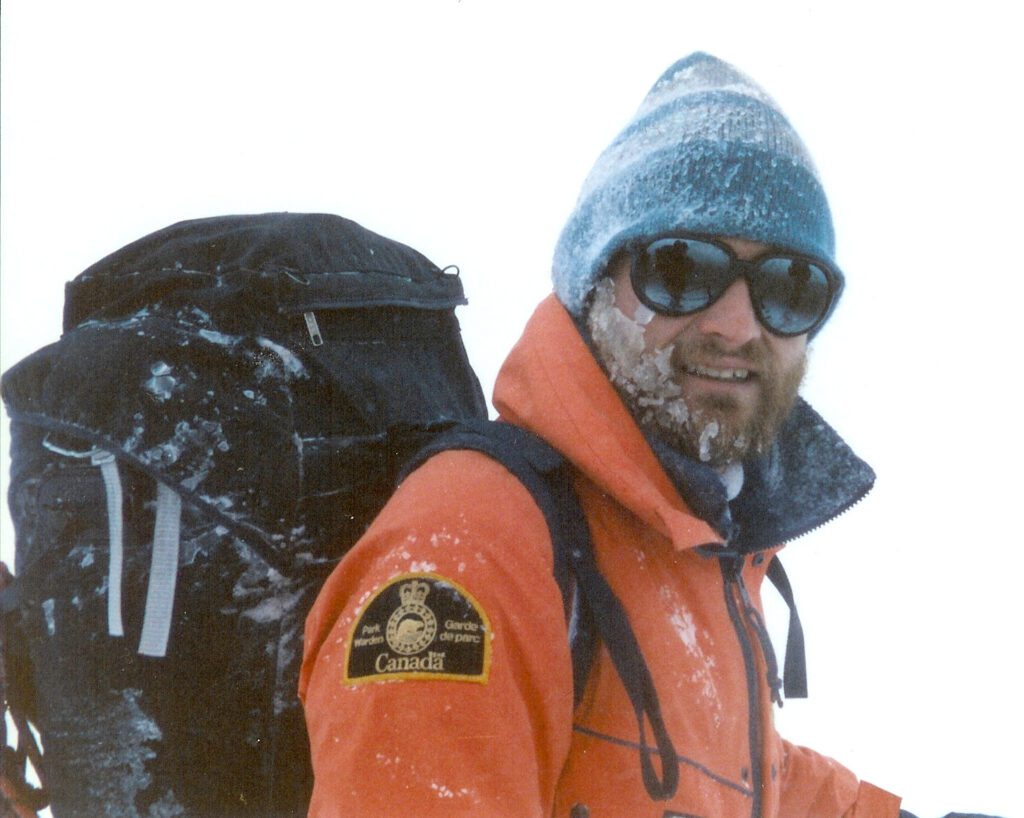
Winter ski school over the Wapta and desPoilus glacier in early 1980’s.
MH 24:39
Well, I’m not going to ask you about more rescue or wildlife stories, because I don’t think you want to elaborate on That’s understandable.
MG: Yeah, I just make it a point not to perpetuate a lot of those myths.
MH: How did the Warden Service change over the years? 2500
MG: Well, we talked about a bit of that earlier with that whole emphasis on ecological integrity and science. And in the early 1990s. There was a big push to change, and it just so happened that I was coincidentally moving my career in that same path at the same time. So everything seemed to align. The other thing that set me up for the future was the whole specialization era. Wardens became specialists, or to some degree specialists, compared to what they used to be back in the 1960s and 1970s. Since I’ve retired, I don’t know what’s happened. I haven’t really looked back. My son, Patrick was a Seasonal Warden. Well, they don’t even call them wardens anymore, they call them Resource Conservation Officers. He was a Seasonal Resource Conservation Officer just like me while he was going to school. And he did exactly what I did. He spent four summers out in the backcountry doing in that case, mostly research stuff, before he pulled the plug here a couple of years ago. He got offered a full-time job as soon as he finished his schooling, but he pulled the plug and went to the Yukon to do his Master’s degree. So to some degree maybe that same style of initiation into the Warden Service is still there, where people get hired on, seasonally, and they spend a lot of their first years in the backcountry. But I really don’t even know how the Parks Service is set up anymore. I just kind of when I walked away when I retired.
